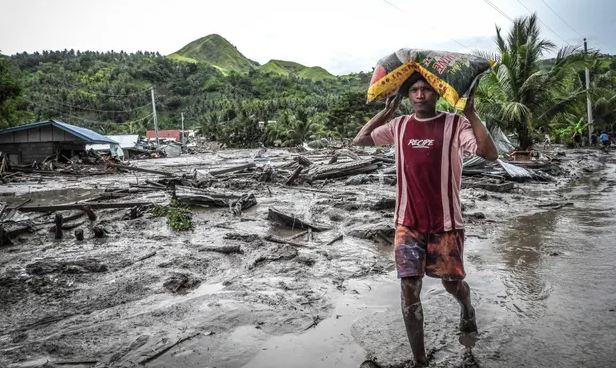The death toll from a devastating storm that has lashed the Philippines in recent days has jumped to 98, the country’s disaster agency said Monday, with President Ferdinand Marcos Jr. set to tour the flood-submerged areas.
The National Disaster Risk Reduction and Management Council announced on Monday that 98 people had died so far as a result of flash floods and landslides triggered by Tropical Storm Nalgae.
The agency said more than half the deaths were recorded in the southern autonomous region of Bangsamoro, mostly due to rain-induced landslides.
Some 63 people were reported missing, while 69 people were injured, the agency said in a bulletin, adding that the Bangsamoro region accounted for 53 deaths, with 22 people still missing.
"We have shifted our operation from search and rescue to retrieval operation because the chances of survival after two days are almost nil," Naguib Sinarimbo, civil defense chief of the Bangsamoro region, was quoted as saying.
Damage to infrastructure due to strong winds and rains has been valued at nearly 758 million pesos (about $13 million), while losses in agriculture are estimated at more than 435 million pesos.
The downpour began on Thursday and swept the north of the county, wreaking havoc in many areas. The storm reached its peak during the weekend.
The state weather bureau said Nalgae, which made landfall five times, is expected to leave the country Monday afternoon or evening and head towards southern China.
Philippine President Ferdinand Marcos Jr. is considering a recommendation from the disaster-management agency to declare a national state of calamity for one year, which would trigger a price freeze and the release of emergency funds.
He is scheduled to fly over flood-submerged districts in Cavite province, near the capital Manila, to inspect the extent of damage before the declaration of a state of calamity. He has expressed shock over the number of deaths, particularly in Maguindanao province in Bangsamoro.
The storm, locally called Paeng, has affected about 590,000 families as it hit areas across the three major island groups of Luzon, Visayas, and Mindanao.
The Philippines witnesses an average of 20 typhoons a year, with frequent landslides and floods.
Many experts link the frequency of extreme weather patterns to climate change.
United Nations Secretary-General Antonio Guterres has raised the alarm about the heavy toll paid by world nations over the consumption of fossil fuels.



























